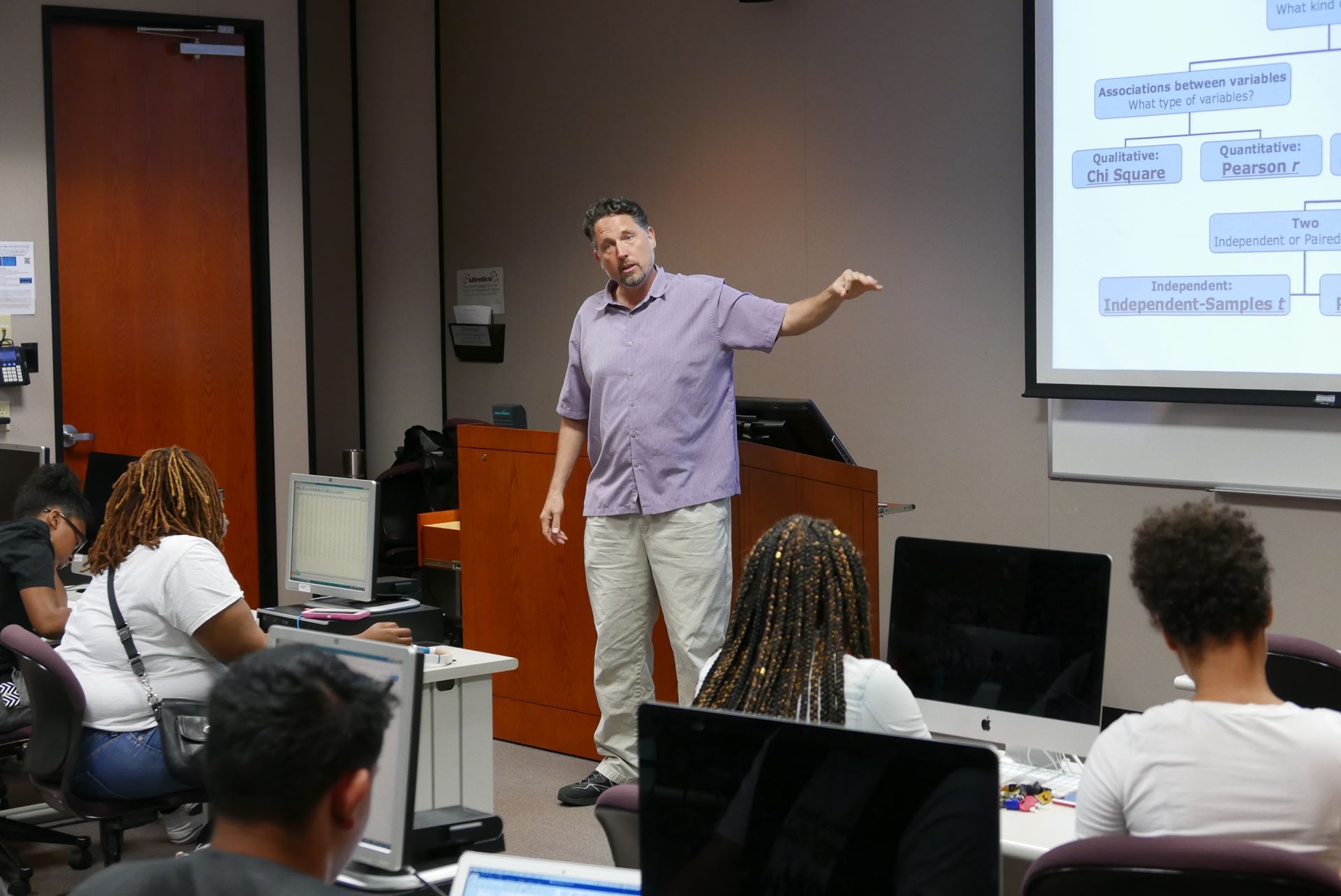 School name: Xavier University of Louisiana
School name: Xavier University of Louisiana
Type of school: Xavier is the only Catholic, historically Black university (HBCU) in the country.
School locale: We’re located in the heart of New Orleans and are a big part of the Gert Town neighborhood.
Classes you teach: I’m a social psychologist by training, but my main courses are Introduction to Psychology, Research Methods, Psychological Statistics, Advanced Research, Social Psychology, Cognitive Psychology, and The Psychology of Stereotyping & Prejudice.
Average class size: Average is around 22 or so, but the range is about 12-40.
What’s the best advice about teaching you’ve ever received?
“Teach less, better.”
What book or article has shaped your work as a psychology teacher?
Wow, that’s a tough one. It’s hard for me to point to one specific teaching reference, but a lot of things have had an indirect influence on me. Because I’m White and most of my students are Black, I pay attention to research on interracial interaction, such as Jennifer Richeson’s collaborations with Nicole Shelton, as well as topics that individuate minority students, such as Robert Sellers’ "Multidimensional Model of Racial Identity". It’s nice for me to appeal to evidence of differential experiences and to have them in mind as I teach and advise my students.
Briefly tell us about your favorite lecture topic or course to teach.
I love teaching statistics because I struggled with it and therefore see why analyses—the basics anyway—seem harder than they are. And because the material builds (rather than being lateral, like in most classes), there’s a clear plan for each day. It also lends itself to interaction as students collaborate on analyses and interpretations, so I think I’m at my best with it.
Briefly describe a favorite assignment or in-class activity.
I’m always a sucker for the Deese-Roediger-McDermott “sleep words” demo that I’m sure a lot of teachers use. I’ve added a lot of embellishments with it to match my style, but I like encouraging students to question their assumptions. I also have had success with a “bad APA style paper” where students collaborate to find APA style errors I’ve inserted in a short manuscript. It’s a bit of a scavenger hunt, and everyone picks up on different style rules, so it gives us a chance to talk about the writing and style without a straight lecture.
What teaching and learning techniques work best for you?
I generally have a casual approach to a class session, and there’s a good bit of give and take. Still, I’m most satisfied when I have regular chances to break things up for students to collaborate and report. I know a lot of teachers ask colleagues for examples of concepts, but I much prefer to have students generate examples, and then the class can examine them and see what about them work and what doesn’t. I get more chances to get to know my students that way and to break up their day. I’m also trying as of late to drop the word “study" from my vocabulary in favor of "practice." It’s difficult to get students to be more active in their approach, and I want them to get beyond simply trying to read and call that studying. I don’t have data showing that the switch is working, but it feels more genuine.
What’s your workspace like?
 It’s an absolute mess. I never seem to finish anything, so I have a ton of papers and things piled up until I decide that I don’t need them anymore. I don’t like it this way and always vow to keep things tidier, but I continue to fail at that. I do have a nice office at home and at work though, so I have nice opportunities to stare out the window when I get stuck.
It’s an absolute mess. I never seem to finish anything, so I have a ton of papers and things piled up until I decide that I don’t need them anymore. I don’t like it this way and always vow to keep things tidier, but I continue to fail at that. I do have a nice office at home and at work though, so I have nice opportunities to stare out the window when I get stuck.
Three words that best describe your teaching style.
Enthusiastic, challenging, inclusive
What is your teaching philosophy in 8 words or fewer?
Students learn best by producing, not consuming, information.
Tell us about a teaching disaster (or embarrassment) you’ve had and how you dealt with the situation.
As I was handing out an exam in an Intro class a number of years ago, a student who’d received it raised her hand as if to ask a question about one of the items. I thought this was very rude so I ignored her until I had handed them all out. When I finally went over to her, she showed me that I had printed the keyed version of the exam. I was mortified and didn’t know what to do, so at first I just said, “Ok, everybody turn your test over, and let me think about this.” I tried working through my options and decided that about all I could do was take them back up and put the test off to the next class period. Fortunately, my students know I’m easily distracted, and we could laugh about it together.
What is something your students would be surprised to learn about you?
I think they’d be surprised to know how hypocritical I am when I discuss proper study and preparation strategies with them. My habits in school were terrible—I got through because I was conscientious enough to put in the time, but I certainly didn’t do it the right way most of the time. I sometimes admit this to students I know well, but I don’t want students thinking that they’ll still get to have a great job if they procrastinate and cram.
What are you currently reading for pleasure?
Mostly, I’m trying to catch up on my New Yorker articles and taking a break with the Onion about every day. For more long-term, I’m half-way done (remember, I never finish anything) with a biography of Johnny Cash and the Book of Barely Imagined Beings.
What tech tool could you not live without?
Dropbox! I remember the days of emailing stuff to myself or trying to keep up with various storage devices, but Dropbox has changed everything for me. Aside from that, I’d say my Mac touchpad so that I don’t have to clear enough desk space to move a mouse around.
What is your hallway chatter like? What do you talk to colleagues about most (whether or not it is related to teaching/school)?
I’m usually running late, so it’s often just a pleasantry, but this is New Orleans, so it’s usually about plans for an upcoming festival or storm, or a recent scandal or Saints game. My colleagues are generally a very harmonious bunch, so I love getting the chance to chat. But even at our happy hours, we talk about teaching and students about as much as anything.
PsychSessions Update: listen to Elliott talk with Garth about Elliott's research interests and ideas about racism/stereotyping research and his path toward teaching at an HBCU (Xavier U in New Orleans) https://psychsessionspodcast.libsyn.com/e070-elliott-hammer-social-psychologist-social-justice-advocate-savvy-decision-maker
